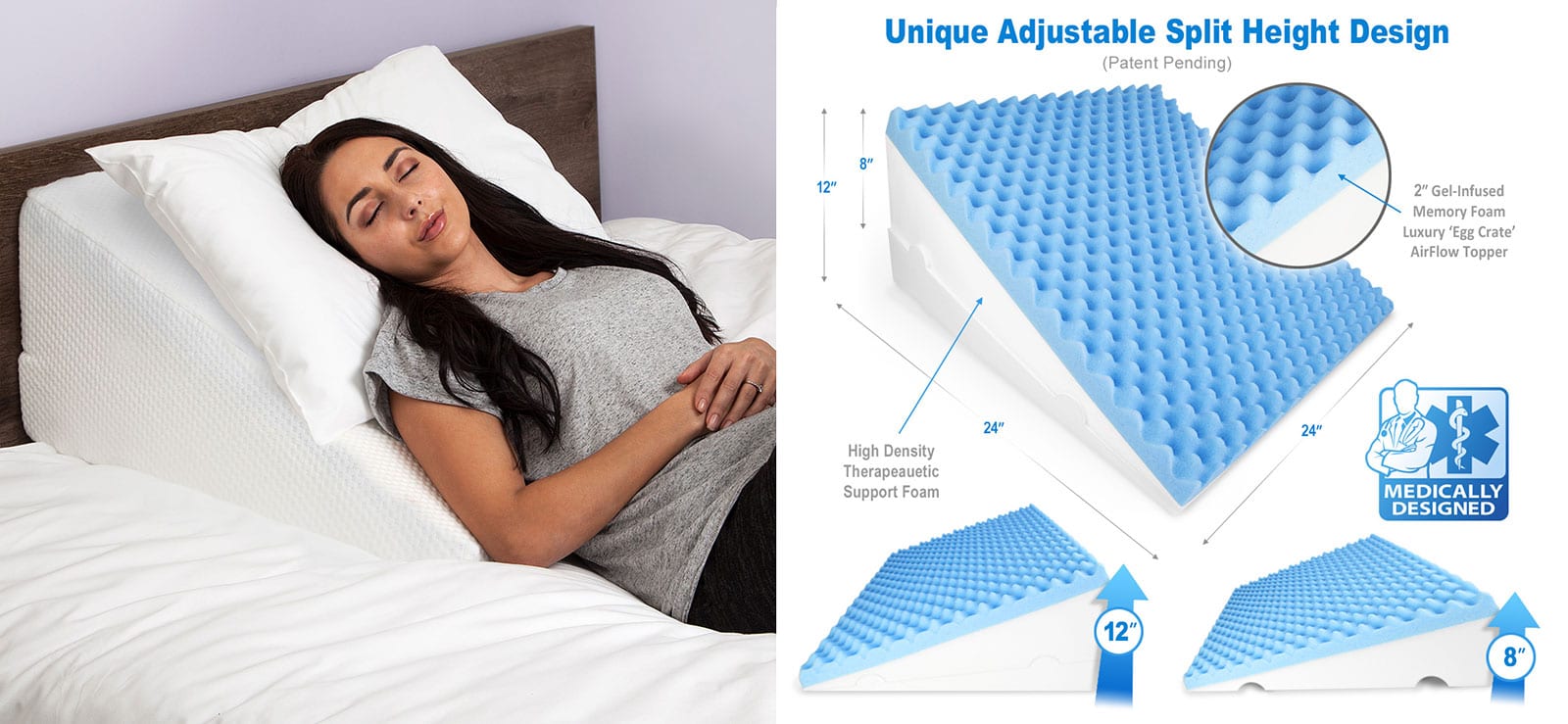Sleeping after Shoulder Surgery
In the United States there are approximately 4.5 million people suffering with shoulder conditions. Whether the cause of the pain is due to rotator cuff repair, scapula or clavicle fracture, frozen shoulder, bursitis or arthritis (to name just a few) shoulder surgery is often the only procedure that will provide any long lasting relief from the condition. In addition to impacting work and leisure activities, shoulder pain has a severe impact on sleep with patients often not being able to find a position that supports and immobilizes the injury and is comfy enough for them to drift off into their much needed sleep!
Why Does Sleeping After Shoulder Surgery Hurt So Much?
Following the majority of types of shoulder operations (including rotator cuff surgery) it is usually recommended by physicians to immobilize the shoulder for 6 weeks. This is to allow the various tendons, muscles, ligaments, connective tissue and nerves to repair in the correct position. If the shoulder makes any large movement during this time then the healing process will take longer and may not heal correctly. This is relatively easy to do during the daytime by wearing a sling which supports the weight of the arm.
However at night time, gravity works against the body. Not only is getting into bed after shoulder surgery a real challenge, but it is often very uncomfortable to lie flat due to compression and the pressure that this causes on the shoulder area. Often patients find the process of trying to move from a vertical to horizontal position just too painful to complete, which leads to weeks of sleeping sitting upright on the couch or in a recliner. In addition to this, the need to keep the shoulder in a sling during sleep adds to the discomfort and the net result is poor quality sleep (if any). By following a few simple steps, there is a way to improve your sleep and get the rest your body needs so that it can repair itself.



Rotator Cuff Surgery Recovery Sleeping Tips
- Pain Killers – plan when the timing of your prescribed pain killers and anti-inflammatory medication so that you are able to take the combination that provides the most pain relief and longest duration 30 minutes before bed time. Reducing the level of the pain felt will give you the best chance of being able to sleep.
- Ease the transition – One of the most painful aspects of sleeping with shoulder pain is actually getting into bed. Moving from a vertical to a horizontal position puts enormous pressure on the shoulder, increasing the level of pain. The easiest way to manage this is to reduce the distance that you need to move. Before you transitioning from standing to sitting on the side of the bed, ensure that all bedding is in the correct position. If you have an adjustable bed elevate the top half as high as you can. If not, use a wedge pillow to reduce the distance to the mattress. Then lower yourself slowly into this elevated sleeping position.
- Wear your sling in bed – most physicians will recommend that post op you wear your sling for 6 weeks day and night. This will enable you to keep your arm and hence shoulder more stable at night preventing unwanted movement (and pain) whilst you sleep. In addition to preventing unwanted movement, it is also important for keeping your arm in the correct position. For many shoulder surgeries, an abduction sling will be provided to correctly position the shoulder which lifts your arm away from the body. When sleeping it is also important to keep this ‘gapping’ between your body and arm so that structures within the shoulder remain in a relaxed position which helps them to heal. If you do not have an abduction cushion, or find it too uncomfortable at night, the same can be achieved by placing a normal pillow under your sling up to your shoulder pit which will provide soft cushioning and aid sleep.
- Swap sides of the bed – if your injured shoulder is on the side of the bed that is next to your partner, then swapping sides is advised to prevent them inadvertently rolling onto your shoulder during sleep.
- Prop your arm up with a pillow – whilst sleeping in an inclined position it is usually more comfortable to pop a small cushion under the injured arm so that it is supported. This will have the effect of encouraging blood flow to the shoulder joint and muscles which will aid the healing process.
- Reclined Sleep Position – It is recommended that you sleep in an inclined sleep position for 6 weeks post shoulder surgery so that the shoulder is not compressed during sleep which would inhibit healing. Many people try to sleep in a recliner which is not ideal as although pressure is kept off the shoulder, it is not comfortable to sleep in for 6 weeks! A better solution is to use a pillow which is designed for this exact purpose. A wedge pillow can be used to elevate you whilst providing the comfort you need to be able to drift off to sleep. Zenesse Health have designed a wedge pillow which is specifically for shoulder surgery rehabilitation. The LuxeLift Support Therapy Bed Wedge Pillow provides a 12 inch height for immediately after surgery, but the unique feature about this particular wedge pillow is that you can alter the height to a lower level of 8 inches. Therefore as your shoulder heals you can reduce the angle of incline until eventually you can resume your usual sleep position.
The above tips are designed to be used together to enable you to get comfortable enough to sleep. If you still are experiencing problems sleeping two weeks after surgery then it may be worth speaking to your physician to gain advice as to whether any further medication is required. Remember that difficulty sleeping after shoulder surgery is temporary and each week you should see a decrease in the intensity of the pain as the ligaments and tendons heal to a fully functioning shoulder.





